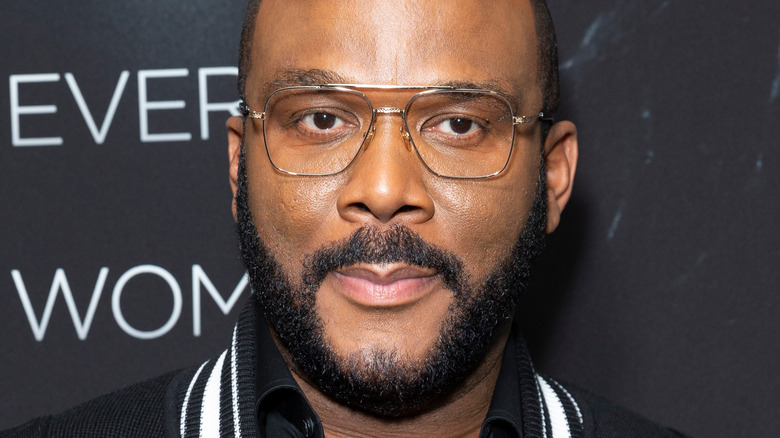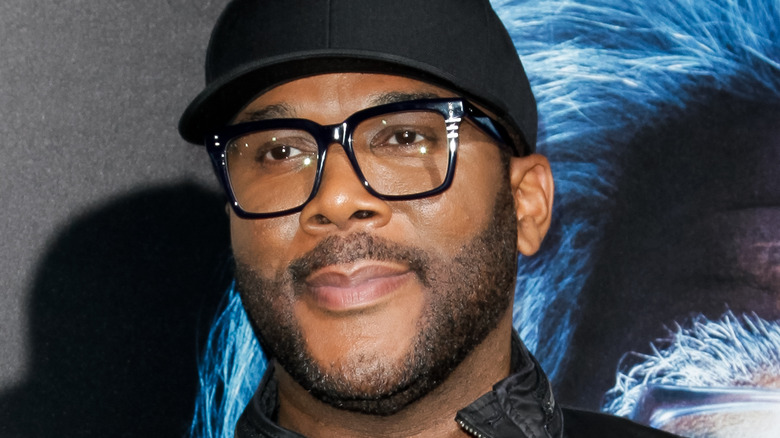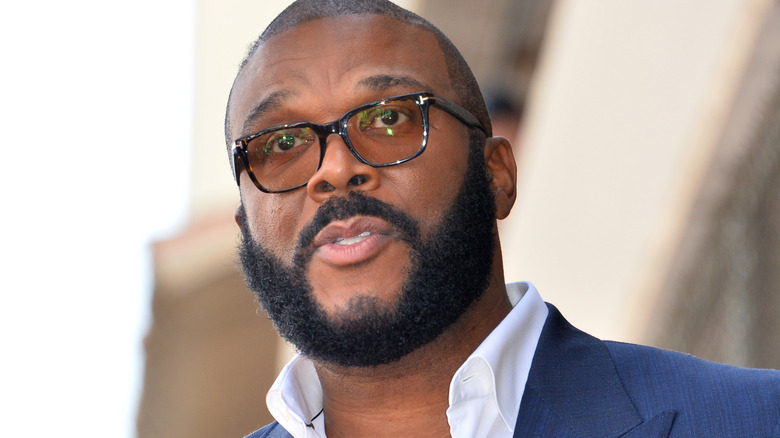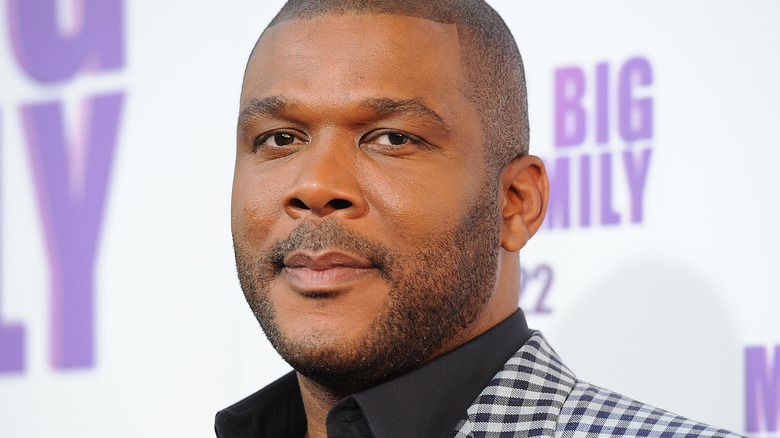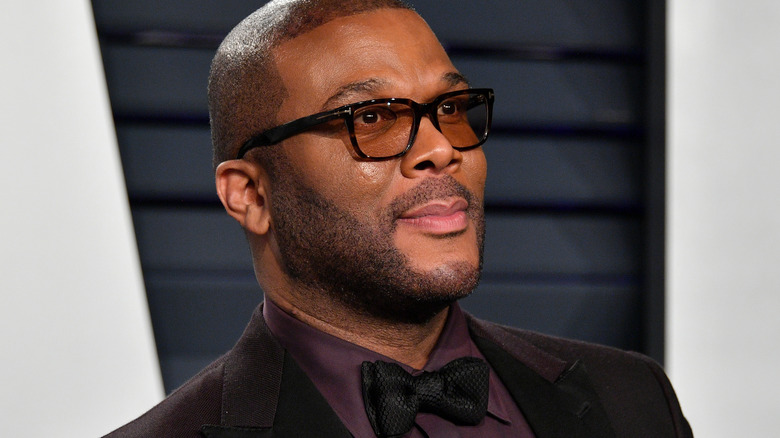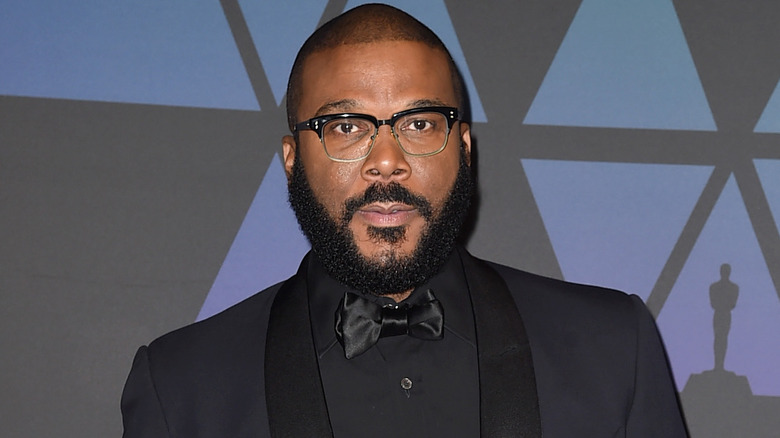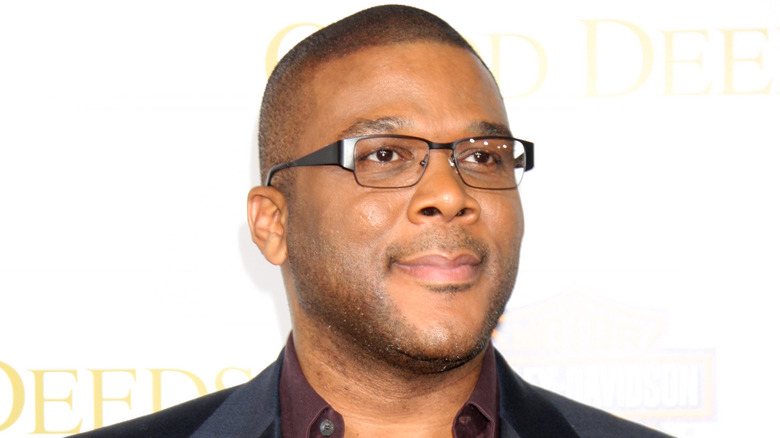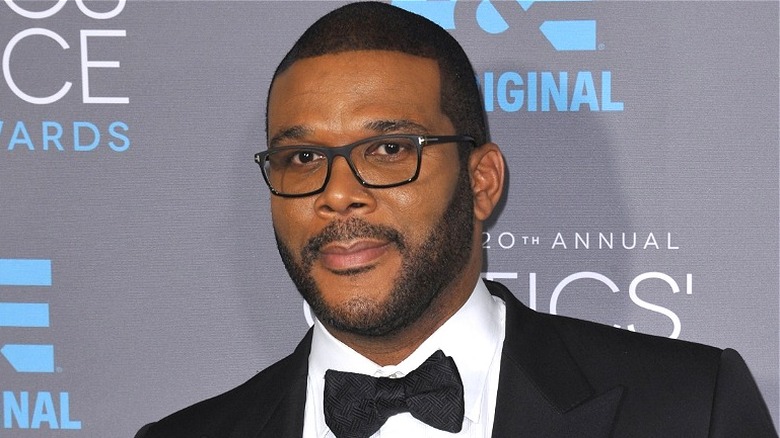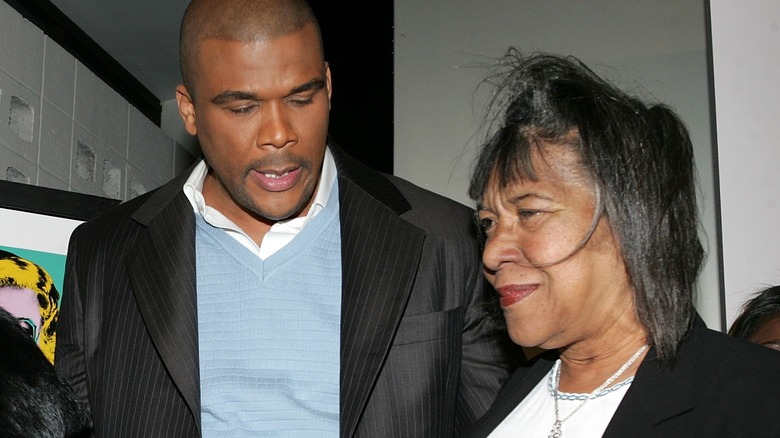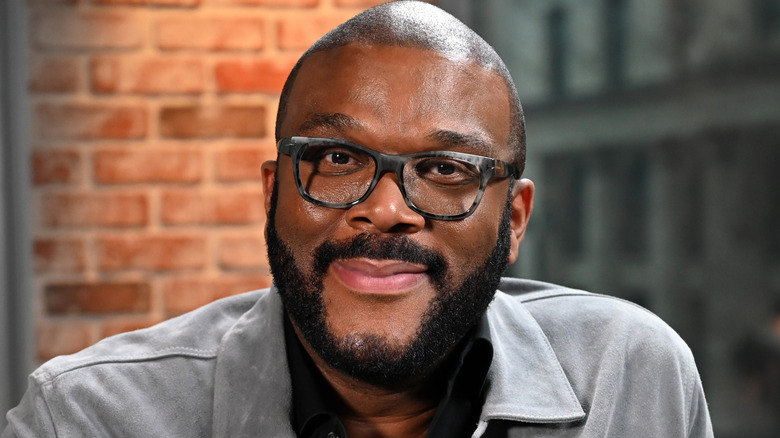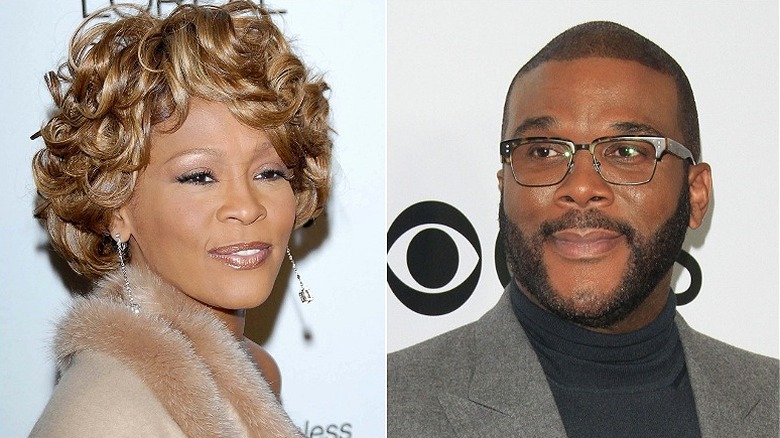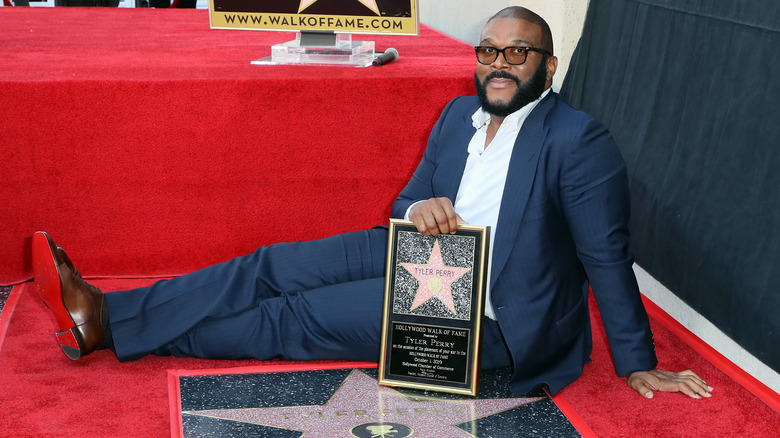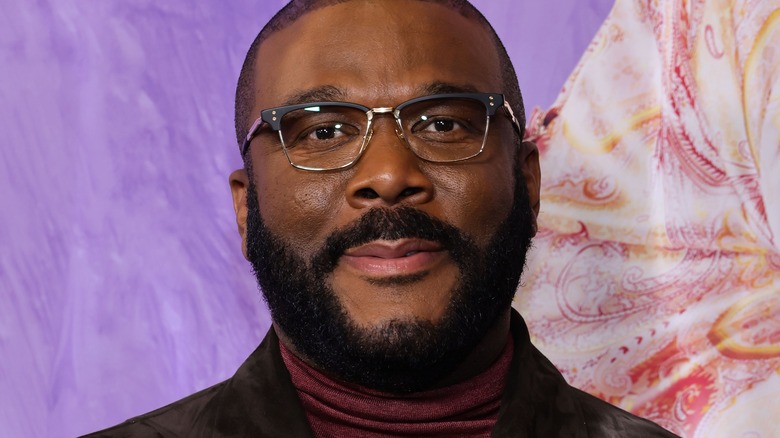Tragic Details About Tyler Perry
The following article contains references to child abuse, sexual assault, racism, and suicide.
Ever since he first donned Madea's silvery wig and signature floral frock, Tyler Perry has seen his popularity explode. While his brand of humor may not be to everyone's taste, his influence on the comedy landscape is undeniable. Moreover, Tyler Perry Studios has been a safe space for Black creatives within the entertainment industry, with the mogul telling Oprah that his work is focused on prioritizing and uplifting Black voices.
Starting out as a playwright, Perry channeled his childhood trauma into art, getting his big break through the cathartic play "I Know I've Been Changed." From that point onwards, and thanks to the "Madea" franchise, he has amassed hundreds of millions of dollars and hordes of devoted Madea stans, though he's also lent his name to somber, Oscar-nominated fare such as "Gone Girl" and "Vice." This illustrious career turned Perry into a billionaire with a whopping $1 billion estimated net worth.
While "Tyler Perry" may be a household name now, getting to the top was no easy feat. For many years, he struggled before becoming the prolific director, producer, writer, and actor he is today. Unlike many others who simply waltzed into the entertainment biz, Perry was forced to overcome a succession of shocking traumas both in his formative years and into adulthood. All the while, he has been able to reflect on — and ultimately heal from — his numerous tragedies with both insight and grace. Be prepared for the waterworks because we're running down tragic details about Tyler Perry.
Tyler Perry's father was a brute with a tragic backstory
As a child, Tyler Perry was subjected to horrendous abuse at the hands of his father, Emmitt Perry Sr. The Perry patriarch frequently inflicted extreme violence upon his son. In 2009, Perry opened up about the abuse in an essay penned on his website. "He was drunk, as he was most of the time. He got the vacuum cleaner extension cord and trapped me in a room and beat me..." he wrote (via People).
Emmitt Perry Sr. had his own tragic backstory. As Tyler Perry explained to Oprah, his father was abandoned as a baby, his body discovered in a drainage canal when he was just 2. Subsequently, he was given to a 14-year-old girl, and, as Perry highlighted, "This girl's parents only knew to beat her, so what she knew was to beat my father. Beat, humiliate, ridicule, all his life. So this is what I was born into."
At one point, when Perry was a toddler, his mom managed to grab her kids and run away from her violent husband (via Vulture). However, his father eventually found them and beat his mom "black and blue from California to Louisiana, as me and my sisters watched." Perry was actually born Emmitt Perry Jr., but as The Guardian notes, he changed his name to distance himself from the man who made his childhood a living hell. "I didn't want to be anything like him. I didn't want to be his Jr.," he told Ebony.
If you or someone you know may be the victim of child abuse, please contact the Childhelp National Child Abuse Hotline at 1-800-4-A-Child (1-800-422-4453) or contact their live chat services.
As a child, Tyler Perry was sexually abused
For years, Tyler Perry repressed memories of the abuse he suffered as a child. But after watching the Oscar-winning film "Precious," which he produced, his childhood trauma was triggered. As he wrote on his website (via People) in 2009, "a large part of my childhood had just played out before my eyes." In the film, the 16-year-old title character is sexually abused by her own father on a regular basis. This brought back painful memories of Perry's own childhood sexual abuse.
He revealed to Oprah that he was sexually abused on a number of occasions. When he was just "6 or 7," Perry recalled, he was assaulted by a man who lived across the street from his family. The man was entrusted with the youngster's care and the two were supposed to build a birdhouse together, but he took advantage of Perry in the most horrific way. As he explained to Oprah, he didn't tell anyone about the assault because he "felt completely guilty about it," which is sadly common with survivors of child sexual abuse, as pointed out by RAINN. Perry told Ebony that he was exposed to things that no child should ever have to face; he didn't even know what sex was.
When he was 10, Perry revealed in his essay, he was abused again by a friend's mother, who attempted to seduce the young boy. Then, he was sexually assaulted by the father of another friend. "It was rape," he later told People.
If you or anyone you know has been a victim of sexual assault, help is available. Visit the Rape, Abuse & Incest National Network website or contact RAINN's National Helpline at 1-800-656-HOPE (4673).
The abuse led to suicide attempts
Facing a barrage of abuse on a regular basis, Terry Perry considered suicide a number of times. As a 2013 study highlights, suicidal ideation is prevalent among child abuse survivors. As Perry explained to Oprah, the relentless abuse left him wondering what the point of being alive was. However, it was his love for his mother and devout faith that got him through those darkest moments. "My mother was truly my saving grace... I would see my mother smiling in the choir, and I wanted to know this God that made her so happy. If I had not had that faith in my life, I don't know where I would be right now," he acknowledged.
One of the most difficult aspects of surviving abuse, he told Oprah, was having his life dictated by triggers, which he likened to "a string to the puppet master" who is "holding you hostage to your behaviors." Eventually, he was able to break away from the triggers by acknowledging that, while the abuse was significant, it did not define him.
Subsequently, having come out through the darkness, Perry wants to reassure others with suicidal ideation that things can get better. "I tell people, if you're thinking about suicide, all that stuff, I've attempted and thought about it," he told Ebony (via CNN). "If you think about it, life gets better... Just keep moving."
If you or anyone you know is having suicidal thoughts, please call the National Suicide Prevention Lifeline at 1-800-273-TALK (8255).
Tyler Perry grew up thinking nobody loved him
One of the most devastating consequences of child abuse is that victims are led to believe nobody loves them, that they were abused because they're inherently unlovable. As psychotherapist Beverly Engel explains in Psychology Today, this is, of course, not the case, but such is the power of abusers to inculcate the minds of victims.
In a heartbreaking admission to Oprah, Tyler Perry said that he grew up feeling unloved. "I remember being a kid and praying in the hell of my house to have somebody love me and somebody that I could love," he revealed. Similarly, he told People that he never "felt safe or protected as a child." In a separate interview with Oprah, he divulged that he was tormented by the fact that his own father "despised" him, something that he struggled to fathom. "I could not figure out why he hated me so," he pondered, "And every action was about his hatred or his disdain for me."
Unfortunately, it wasn't just his father who damaged his self-esteem. Although Perry adored his mother and the pair remained close, she could also be cruel at times. When Perry expressed his desire to make it in Hollywood, she attempted to discourage him. "My mother said to me, 'You are never going to make it, so stop what you're doing,'" he told the Los Angeles Times. Perry did defy his family's low expectations, however. In fact, he excelled beyond his own wildest dreams.
If you or someone you know may be the victim of child abuse, please contact the Childhelp National Child Abuse Hotline at 1-800-4-A-Child (1-800-422-4453) or contact their live chat services.
He discovered shocking family secrets
In 2014, Tyler Perry revealed that a DNA test concluded that Emmitt Perry Sr. is not his biological father. "I love my mother to death, but she lied to me," he said at the 2014 Women's Empowerment Conference (via International Business Times). This was something Perry had long suspected, feeling a distinct disconnect between himself and the man he called "dad." He then emphasized the importance of parents being upfront with their children. "For the peace of that person, let them know," he added.
This wasn't the only dark family secret Perry would unearth. In a personal essay posted on his website (via People), Perry revealed that he discovered his own father had sexually abused a friend at a time when Perry himself was being molested by neighbors and family friends.
Speaking with Oprah, Perry said that his father felt no remorse for his abusive actions — both against his son and others. Despite this — and despite the fact that Perry Sr. isn't his biological father — the filmmaker continues to provide for him financially, with Oprah noting that the elder Perry lives in a mansion purchased by his son and receives frequent checks in the mail. However, the pair no longer have a relationship, since being around Perry Sr. causes the director too much emotional trauma and painful memories of a childhood blighted by violence. "For the longest time I was driven by fear — fear of ever having to return home to my father," he admitted to Essence.
If you or anyone you know has been a victim of sexual assault, help is available. Visit the Rape, Abuse & Incest National Network website or contact RAINN's National Helpline at 1-800-656-HOPE (4673).
The excellent student was kicked out of school
At school, the creatively inclined Tyler Perry excelled. But his academic success was hindered by the omnipotence of trauma. Rather than being proud of his academically adept child, Perry Sr. castigated his son, his intellect being yet another excuse for abuse. "He would scream at me, 'You're a dumb motherf***er, you got book sense but you don't have no street sense!'" Perry revealed to Oprah. "'Cause he hated the fact that I would read and draw and get straight A's in school."
For the young Perry, being constantly berated led to manifestations of his own volatile behavior. Subsequently, he told Oprah, he was kicked out of school after saying "some pretty nasty things" to a counselor, noting that he was overwhelmed with anger due to the abuse. Perry reportedly once said that he was "hell on wheels" in adolescence (via "Tyler Perry"). "I wanted negativity. I thrived off it," he elaborated. The Hill points out that it's often difficult for male survivors of child sexual abuse to open up about their trauma, which may help to explain Perry's destructive behaviors prior to unburdening himself of the truth.
After being kicked out of high school, Perry decided to channel his anger into writing a play about child sexual abuse survivors, entitled "I Know I've Been Changed." He told Forbes, "You got to understand, I had no mentors... Everything I've learned, I've learned in progress."
If you or someone you know may be the victim of child abuse, please contact the Childhelp National Child Abuse Hotline at 1-800-4-A-Child (1-800-422-4453) or contact their live chat services.
If you or anyone you know has been a victim of sexual assault, help is available. Visit the Rape, Abuse & Incest National Network website or contact RAINN's National Helpline at 1-800-656-HOPE (4673).
The difficult road to recovering from abuse
Forgiveness is a challenging concept for anyone who has endured abuse, particularly when it is inflicted by one's own family. As Tyler Perry admitted to Ebony, the horrors of his home life initially instilled in him a sense of hopelessness, leaving his childhood in pieces: "I look at people who don't really understand what that does to a child... When that happens, it completely destroys your world."
His first play, "I Know I've Been Changed," was a healthy outlet for him. As Perry explained to Variety, writing it was a catalyst for major changes in his life. "It was about adult survivors of child abuse who have forgiven their abusers and I hadn't forgiven my father," he divulged. "Once I forgave him, the show took off."
In an interview with Essence, he acknowledged how easily abuse can shape a person's life for the worse, noting that one "can be completely ashamed of" trauma and be destroyed by it, "or you can take the power out of it by using it as a teaching tool to help others." Ultimately, Perry decided on the latter. Speaking with People, he elaborated on how he was able to make that difficult road to recovery. He explained that through extensive prayers he could come to terms with what he had endured, and forgive. Additionally, he came to the realization that "holding on to what I was holding on to wasn't hurting him... but it was killing me."
If you or someone you know may be the victim of child abuse, please contact the Childhelp National Child Abuse Hotline at 1-800-4-A-Child (1-800-422-4453) or contact their live chat services.
Tyler Perry couldn't help his mom before she died
Tyler Perry's mom, Willie Maxine Perry, was always the strongest force in his life. When everything was falling apart, he knew he could rely on her. Accordingly, his immense drive toward realizing his dreams was in part propelled by an inherent need to look after his mother. In an interview with WebMD, he said that he had long measured success through his ability to make "enough money to take care of my mother."
Accordingly, Perry told Oprah, he wanted to give his mom "everything my father didn't give her." But in Willie Maxine's final moments, her son realized that he couldn't help her. This was extremely difficult for Tyler Perry to come to terms with. "One of the most painful things I ever had to do was bury her, realizing that even though I was her hero... I couldn't help her get better," he confessed.
In 2009, Perry's mom died at the age of just 64, per Reuters. He had previously revealed that she was his inspiration for Madea. Reflecting on his mother's passing, the filmmaker acknowledged that the abuse was as difficult for her as it was for him. "She suffered so much horror in her life — surviving breast cancer, the abuse from my father, the belittling, the beatings," he told Oprah, adding that he refused to go public with revelations of the abuse until his mom died, as he didn't want to cause her any additional pain.
Homeless, Tyler Perry slept in his car
After leaving high school, Tyler Perry decided to relocate to Atlanta, but he soon found himself struggling. During a press junket for "Teenage Mutant Ninja Turtles 2" (via The Atlanta Journal-Constitution), Perry revealed that he put all his money into a play, but hardly anyone showed up, leaving him "homeless with no money and nothing to my name." Destitute, he slept in his car. Despite this dark period in his life, Perry has been able to reflect upon it with gentle humor. "Can you imagine a six-foot-five man sleeping in a Geo Metro?" he joked to Essence.
As noted in Ebony, he attempted to collect pennies to find food for the week: a $1 pack of cookies. But he was determined to get out of the situation, which he did by inventing the iconic Madea. On Facebook, he observed an Atlanta highway sign that now bore the name of his eponymous studio, exemplifying how far he has come. "Atlanta has truly been the promised land for me. I came here with nothing... ended up homeless and starving, but I was always praying and believing," he wrote.
As chronicled by Forbes, Perry went from homeless to billionaire, earning over $1.4 billion between 2005 and 2020, in the outlet's estimation. Reflecting on his impoverished roots, Perry told Forbes that having been "poor as hell" makes his success all the more meaningful.
He tried to save his friend Whitney Houston
Tyler Perry was close friends with Whitney Houston and felt a strong sense of responsibility toward her wellbeing. In 2013, he explained to Oprah that he had "to do all I could to help her because I sensed... that there is a death day coming." As noted in the interview, Perry tried his hardest to get Houston the help she needed, but, tragically, she died in 2012, aged just 48.
To honor his promise to protect his late friend, Perry aided the singer's daughter, Bobbi Kristina Brown, when she wanted to embark on an acting career. "At the studio, there is this tremendous net of safety," he told Oprah. "It's an eagle's nest for anybody who wants to come in to Tyler Perry Studios and work. It is not a place to stay; it is a place to come in, learn to fly, and soar, so I wanted her to feel that." Moreover, Perry explained that he gave Brown roles as a means of ensuring her safety.
Although Perry gave Brown a safe space, she, too, was troubled. In 2015, she died at the age of just 22 in circumstances that were eerily analogous to her mother's death. When she died, Perry poignantly tweeted, "I'm a writer with no words." As reported by the Mirror, he created a heartbreaking video for Brown's funeral, in which he shared childhood photos as her mother's music played. The outlet notes that Perry visited Brown frequently when she was in a coma for six months prior to her dying.
Tyler Perry faced racism throughout his career
From an early age, Tyler Perry was exposed to the realities of prevalent racial injustice. Speaking with Variety, he recalled feeling incensed when his father would make $800 as a contractor, but his white boss would make $80,000 from selling houses. "I never understood why my father didn't sell his own houses... So watching that happen, I knew from a young age that I wanted to be the man who owned the house," he revealed. While the Madea character — and Perry's films in general — have faced intense criticism, Perry has long emphasized that he believes creating a Black-owned media empire is instrumental in dismantling the racism of the film industry. "Ownership changes everything," he told Forbes.
With regard to starting a career in the film industry, he told Variety in an earlier interview that "Hollywood wanted nothing to do with me." He went on to recount the bigotry he was subjected to by white execs, which propelled him to create his own studio. The filmmaker recalled an instance in which a white studio head claimed that "Black people who go to church don't go to movies, so this will never work." Yet, as Perry noted, he was "seeing thousands of people all over the country come out for these shows."
Despite his vast fame, riches, and accolades, Perry still faces racism, explaining to People that, as a Black man, it was his duty to prepare his son for the "harsh realities" of racial discrimination.
If you or a loved one has experienced a hate crime, contact the VictimConnect Hotline by phone at 1-855-4-VICTIM or by chat for more information or assistance in locating services to help. If you or a loved one are in immediate danger, call 911.
His nephew's tragic death
In 2020, Tyler Perry would face yet more unbearable loss when his nephew, Gavin Porter, died under alarming circumstances. TMZ reported that Porter was found dead in prison of an apparent suicide. He was just 26. However, Perry, along with other family members, suspected that there was foul play involved, considering that Porter was involved in a brawl with fellow inmates shortly before his death and was subsequently put into solitary confinement, per News Star. To make a tragic situation even sadder, Porter, who was the son of Perry's sister, was serving 20 years for killing his father following a heated argument in 2016.
An autopsy ruled Porter's death a suicide, but Perry wasn't buying it. He hired a pathologist to perform a second autopsy, per USA Today. On Instagram, the filmmaker wrote, "Three days ago, I got the horrible news that he allegedly committed suicide in prison. I say allegedly because, unfortunately, our criminal justice system and prisons have been notorious for cover ups and/or getting it wrong." He added that, while Porter was responsible for a murder that "shook our entire family to its core," he deserved justice and a proper investigation into his death.
Soon after, TMZ reported that the second autopsy concluded there was no foul play in Porter's death. Sadly, the 26-year-old had taken his own life. "The answers don't take away grief, but it surely gives room for grieving to take its course," Perry told the outlet.
If you or anyone you know is having suicidal thoughts, please call the National Suicide Prevention Lifeline at 1-800-273-TALK (8255).

